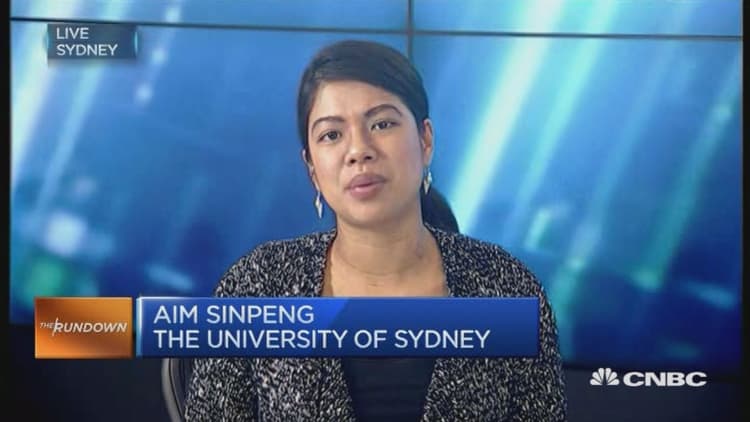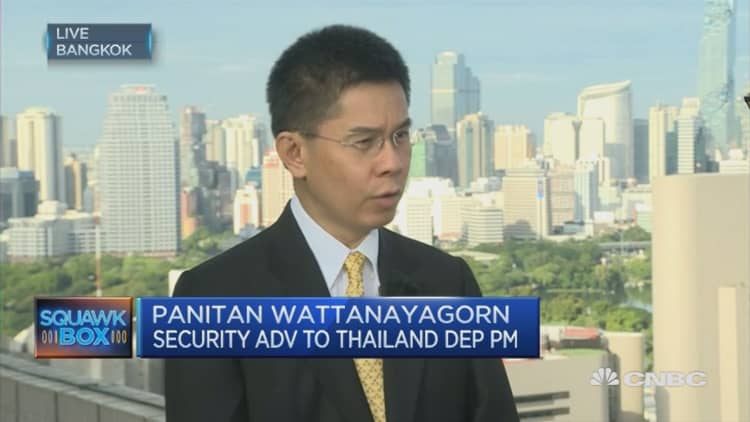


Democracy may be a casualty of Thailand's newly approved constitution, but the referendum's result may also boost the country's struggling economy.
Voters accepted the military-backed constitution in Sunday's referendum, with 61.4 percent in favor with 94 percent of the votes counted, Reuters reported. But turnout was considered relatively low at only 55 percent of the electorate. It was the country's 20th constitution in 83 years.
Aim Sinpeng, a lecturer in comparative politics at the University of Sydney, told CNBC's "The Rundown" that investors were expected to look at the outcome favorably.
"Given the mandate that's given to the military, it would at least buy Thailand some time for the government to come up with an actual economic plan for the country," Aim said.
"That time would be stable and less challenged compared to the previous two years of military junta, where it started to look really rocky."
The country's economy has stumbled amid a lack of external demand for its exports given the sluggish global backdrop, while the political uncertainty within the country had slowed investments and discouraged tourism, a key sector for the country.
On Monday, the Bank of Thailand said it expected this year's gross domestic product (GDP) was expected to growth 3.1 percent, Reuters reported.
But Aim added, "the very foundation of the political system will be undermined by a number of undemocratic clauses" in the constitution.
"It's very clear from the beginning that this constitutional draft was to provide the un-elected elite, particularly the military, a permanent hold on power on Thailand," Aim said.
A member of the current Thai government disagreed.
Panitan Wattanayagorn, adviser to the deputy prime minister for security, told CNBC's "Squawk Box" that "Prime Minister Prayut [Chan-o-cha] is committed to have an election next year. I think that's very clear."
Panitan said that while the new constitution gave the military-appointed senate the ability to choose the prime minister in times of crisis, he didn't believe it would be easy for the senate to step in easily.
"I think the Thai people, the general public have shown in the past that if the parliamentary members stepping overboard, stepping beyond the line, there will be trouble," Panitan said. He also noted that the Election Commission planned to invite more international observers for the next general election to increase the transparency.
Others also expected the new constitution would reassure investors.
"You might not be too happy about the democratic process," Song Seng Wun, a regional economist at CIMB, told CNBC's "The Rundown."
But he added, "Investors will probably prefer the outcome on that clarity if the military is running the place. From the standpoint of building up the economy, there is that clarity."
A military junta has ruled Thailand since May 2014, when the country witnessed its twelfth successful military coup since it became a constitutional monarchy in 1932. Army chief Prayut Chan-o-cha was installed as Prime Minister, toppling the elected but controversial government of Yingluck Shinawatra and abolishing the existing constitution.
At the time, Prayut called the coup a peacekeeping effort aimed at ending months of political unrest. He has said that democracy can only be restored once there is political stability, adding that the country would hold general elections once a new constitution was in place.
Markets were likely to view the referendum as a step toward restoring political normalcy, said Kobsidthi Silpachai, head of capital markets research at Kasikornbank.
"This large milestone that we've been holding our breath for has come and passed and it has gone rather smoothly without any hitches, without any violence. So I think people are going to express that we're taking our baby steps toward normalization, toward democracy so I think that's a good plus," Kobsidthi told CNBC's "Squawk Box."
"What investors are more concerned about is actually no violence, continuity of policies. They get visibility on how they can plan towards foreign direct investment," he said.
The baht didn't appear to have reacted too much to the referendum. The dollar was fetching 34.96 baht on Monday morning, compared with around 35.08 baht on Friday. That was up only slightly from levels around 34.77 at the beginning of the month, even as the dollar strengthened after positive economic data in the U.S.
Thailand's SET index opened up 1.35 percent on Monday, with the index up nearly 20 percent so far this year.
Some didn't expect the referendum would have much effect on the economy or investor sentiment.
In a statement on Monday, Standard & Poor's Global Ratings said the level of political uncertainty in Thailand remained "significant," and the vote only reduced it "modestly."
"It is unclear if the next elections will yield a government that bridges the political divide in the Kingdom and pushes ahead with policies that could reinvigorate economic development," S&P said. "Private sector investment is likely to remain weak over the next year or two. We expect economic performance to remain relatively subdued and prevent meaningful improvements in the sovereign credit metrics."
It kept its foreign currency sovereign rating on Thailand at BBB+, with a stable outlook. S&P's BBB level indicates "adequate protection parameters," but adverse conditions could lead to a weakened ability to meet financial commitments.
Others also didn't expect much change after the referendum.
"The expectation is that the military government remains in place until well after the succession. The market wasn't really looking at this referendum as a significant event," said Adrian Mowat, chief Asian and emerging market equity strategist at JPMorgan.
"The government wasn't going to change. Policy wasn't going to change regardless of the outcome of the referendum," he told CNBC's "Squawk Box."
—Nyshka Chandran contributed to this article.
Follow CNBC International on Twitter and Facebook.
—By CNBC.Com's Leslie Shaffer; Follow her on Twitter @LeslieShaffer1


